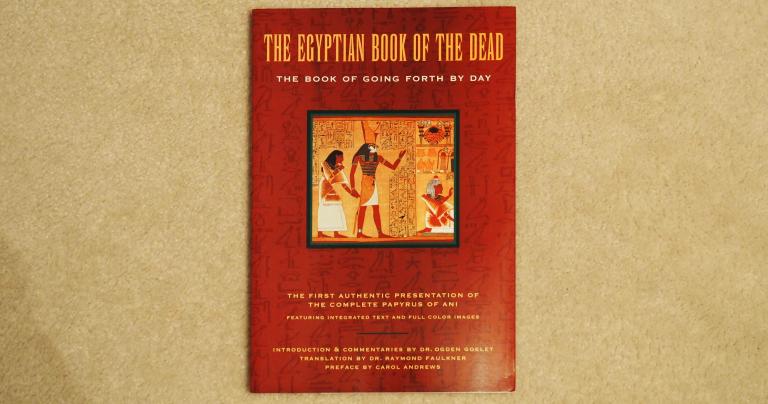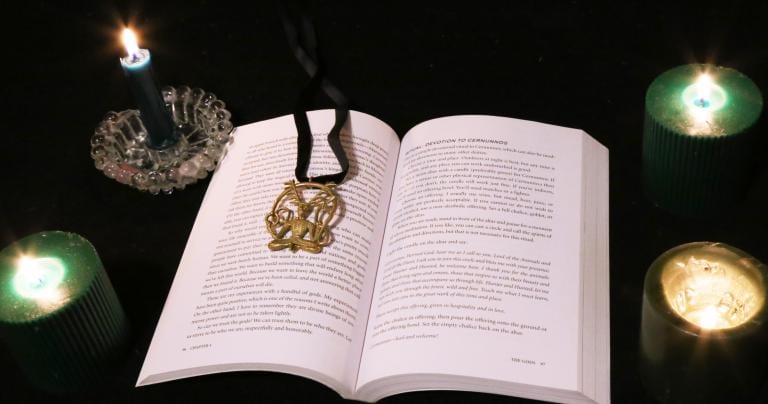Last week Morgan Daimler had a Facebook comment that’s worth exploring in detail:
Even in magic it’s probably not a good idea to randomly use words from another living language you don’t understand. You don’t sound more mysterious or spiritual this way, you just really confuse people who speak that language and can’t figure out why you’re using that term for that reason.
There is power in ritual language. But too many people try to grab that power and they mistake “foreign” (to themselves) for “inherently deep and meaningful” without thinking about what they’re doing. They end up like the white folks who get Asian character tattoos that don’t say what they think they say.
This isn’t a problem that can be solved with better translations. It requires thinking through what you’re trying to do and then selecting the best method to accomplish it.
The Gods transcend language
I occasionally hear people say something along the lines of “we should speak to the Gods in their native language.” Human languages are human inventions – if the Gods have a native language it’s unknown to us. I can tell you from first-hand experience that you don’t need to be able to speak Greek (either ancient or modern) to communicate with Athena.
And what would be the native language of Cernunnos? His name may be Gaulish but He is far, far older. While occasionally He speaks to me in standard American English (because, I assume, He wants me to understand something very precisely, and that’s the only language I speak), often He speaks in impulses, urges, and feelings. What else would you expect from a God of the Wild?
If you want to speak to a deity, simply speak to Them in your native language. They’ll understand you just fine.
What about ancestors and other non-divine spirits? There are numerous reports of the dead communicating with the living in specific languages, so I’m reluctant to say the ancestors transcend language. On the other hand, I’ve never experienced a language barrier, so I assume they can understand us one way or another.
The bottom line is that ritual and magic don’t need “ancient” or “magical” languages to be effective. Speak clearly in the language you and everyone else in the room understands.
Language is part of culture – culture and religion are intertwined
This is not to say that speaking in a language from the place where a deity was first worshipped has no value. It does.
If you want to be able to read the earliest stories of the Tuatha De Danann you have to be able to read Old Irish. If you want to be able to read the works of Homer and Plato you have to be able to read Greek.
If you want to be Greek, you need to speak Greek.
I mostly worship Celtic Gods, but I do not call myself a Celt or a Celtic Pagan. I have ancestral roots in Celtic lands, but I’ve never lived there and I don’t speak any of the Celtic languages. “Celtic” is a culture, not a bloodline. I’m an American, a Tennessean, and a Texan – who worships Celtic Gods.
Learning another language helps you connect to the people and the land where that language was and is spoken. Making those connections is one of the steps to legitimately developing a cultural identity.
But you do that by learning the entire language, not by grabbing a handful of ritual phrases.
Do not use words you don’t completely understand
Have you ever started to read the instructions for something that was made in another part of the world and realized “the person who wrote this doesn’t understand English as well as they think they do”? They learned it from a book or they used Google Translate and while they may be able to get their message across, what they actually said was just wrong.
As an aside: never make fun of someone who speaks or writes a second language poorly. At least they’re trying.
But this is what happens when you try to translate a thought expressed in one language into another language that doesn’t just use different words, but that expresses thoughts in different ways. And that’s before we get into idioms, puns, double entendres, and other subtleties of language.
If you ask “how do I say this in Irish?” (or Greek or Bulgarian or any other language) you’re on the road to making a serious mistake.

There is power in ritual language1
This doesn’t mean your rituals must be conducted in 100% newscaster-approved American English (or whatever the predominate language is where you are). There is power in ritual language: the Latin Mass or the Arabic Call to Prayer. The King James Bible remains popular not just because fundamentalists think it’s special, but because even an atheist like Richard Dawkins recognizes the power of its language.
Ritual language need not be foreign or archaic. It simply has to be non-ordinary: words and phrases that say “this is special” and “this is holy.” After all the pre-ritual announcements and informal introductions, I usually say simply “let us now begin.” Four very ordinary words, but one very non-ordinary phrase.
Read through the spoken parts of one of the solitary rituals. Read the lines aloud and feel how they’re subtly different from ordinary speech. Read through Jason Mankey’s 1899 Ritual and you’ll get the same thing.
In addition to being non-ordinary, ritual language has power because of what we associate it with. When we say “let us now invite the spirits of the elements and directions to join our circle” the power isn’t just in hearing something we don’t hear in everyday life, but from our past experiences where these words were followed by transformative rituals – rituals where those spirits showed up. There is a Pavlovian effect here.
That only comes with time and repetition, but it’s absolutely authentic and valid… unlike throwing a poorly-fitting non-English phrase around because it sounds mysterious.
Use words and phrases in their original context
When you can legitimately use words from other languages, it provides a tangible connection to the lands and the people who inspire our practices. Names are easy to use properly: names of Gods and places, seasons and holy days, names for ritual tools and practices that have no equivalent in modern languages.
Be careful with titles, especially if you want to claim one as your own. In general, be careful with claiming any title in any language. Just do the work – if you need a title, someone (or Someone) will give it to you.
Where we have prayers and blessings in original languages, using them creates a powerful link to the ancients. Even then, though, I include translations for the participants who aren’t familiar with them.
In general, if you’re using something in its original context, you’re probably doing a good thing. If you write something in English and translate it into another language, you’re running a serious risk of error.
There are exceptions. Translating modern words into dead languages helps bring those languages back to life for a few moments. Best to use these for emphasis, rather than trying to do an entire ritual in ancient Egyptian (unless, I suppose, your entire group is trying to become proficient in ancient Egyptian).
Much of the power of ritual language comes from its uniqueness. If you overuse it, it loses its power.
How you say it matters as much as what you say
If you’re going to use non-English words in your rituals, put some effort into pronouncing them correctly. Now, language is a fluid thing and pronunciation varies with time and place – something I experienced first-hand when I moved from Tennessee to Indiana… not to mention when I traveled from Dallas to London. There are many right ways to pronounce a word. But it is never correct to pronounce Samhain as “SAM-hane.”
But be gentle with new people – this was all new to you at some point too.
If you want to create an atmosphere of reverence or magic, pay attention to your delivery. Many people simply don’t read well aloud – it’s not a skill most of us practice. But even with practice, there’s a difference between reading a part or reciting it from memory and performing a part. I covered this in a post last year: while ritual should never degenerate into melodrama, sacred theater has been a part of religion at least since the ancient Greeks.
Listen to good speakers, especially religious speakers. Hear and feel what works well and copy it. Hear and feel what sucks and avoid it.
Mainly, put more time into learning how to facilitate ritual and less time into trying to come up with mysterious-sounding words and phrases.
1 James Hoscyns and Anomalous Thracian presented a paper titled “Language in Devotional and Occult Relations” at last year’s Mystic South conference that covered some of these topics from an academic perspective. Unfortunately, that paper is not currently available, and after nine months my memory of the presentation is rather vague – except that it was excellent. How much of this section is a repetition of their ideas and how much is my own thinking is impossible to say.
If you ever have the opportunity to examine their work on this subject for yourself, please do. And if there’s anything here that’s wrong, it’s safe to assume the error is mine and not theirs.














